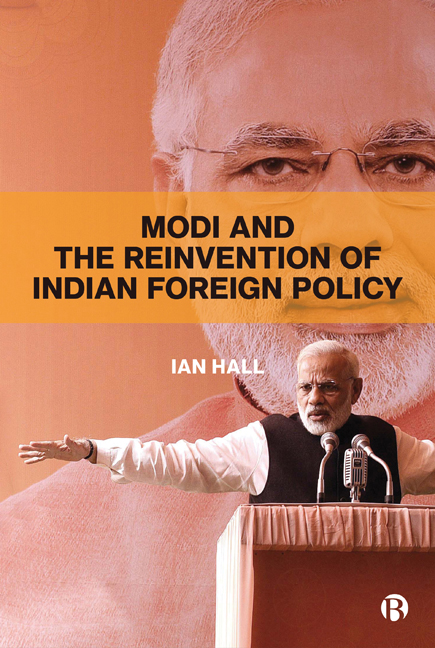Book contents
- Frontmatter
- Contents
- Abbreviations
- Glossary
- Notes on the Author
- Acknowledgements
- Preface
- 1 Introduction
- 2 Nonalignment to Multialignment
- 3 Hindu Nationalism and Foreign Policy
- 4 Modi and Moditva
- 5 World Guru India
- 6 Prosperity and Connectivity
- 7 National Power and Regional Security
- 8 Conclusion
- Notes
- References
- Index
- Frontmatter
- Contents
- Abbreviations
- Glossary
- Notes on the Author
- Acknowledgements
- Preface
- 1 Introduction
- 2 Nonalignment to Multialignment
- 3 Hindu Nationalism and Foreign Policy
- 4 Modi and Moditva
- 5 World Guru India
- 6 Prosperity and Connectivity
- 7 National Power and Regional Security
- 8 Conclusion
- Notes
- References
- Index
Summary
Narendra Modi need not have invested so heavily in foreign policy after coming to power in 2014, in terms of either time spent on foreign visits and summits or on trying to recast it into a different – broadly Hindu nationalist – idiom. His government faced considerable domestic challenges and the approach to international relations Modi had inherited from his predecessor – while perhaps not optimal – was at least serviceable. The fact that Modi devoted scarce resources to trying to reinvent Indian foreign policy demands some explanation.
That this activity did not result in major shifts in Indian strategy makes his attempt at reinventing foreign policy even more puzzling. Modi might have had a ‘transformative agenda’ and even a ‘fluid, dynamic multilevel alignment cognitive script’, as sympathetic analysts have suggested (Tremblay and Kapur, 2017, pp. vii, viii), but it is not clear that India's basic approach to managing key relationships and challenges changed. I have argued here – as others have done elsewhere – that the ‘fundamentals’, as Rajesh Basrur calls them (2017), were not modified. India continued to prioritise domestic economic development. New Delhi drew closer to the US, as it has since the early 2000s, and hedged between engagement and pushback in the face of China's growing power. It deepened strategic partnerships with states and slowly augmented its engagement with regional institutions. It continued to pursue soft power and status, while struggling to pursue hard power and leverage. To be sure, Modi showed more muscularity toward Pakistan, in particular, but his government was unable to translate tactical wins, such as they were, into lasting gains.
So why did Modi try to reinvent Indian foreign policy and why did this project fall short of its objectives of making India ‘a force for peace, a factor for stability and an engine for regional and global prosperity’ (MEA, 2017a)? The answers to these questions are, I argue, interlinked. The reinvention was driven by a mix of ideological conviction and electoral calculation – calculation that, in the event, helped deliver electoral dividends, especially in 2019.
- Type
- Chapter
- Information
- Modi and the Reinvention of Indian Foreign Policy , pp. 147 - 158Publisher: Bristol University PressPrint publication year: 2019



